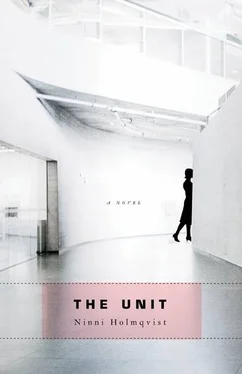The question came up again in different guises and different packaging, and somehow it had slipped into the manifestos of some of the bigger and more established parties, and when the referendum finally took place, opinion had shifted. At that stage I was already more or less a grown woman with my sights set on a career as a writer. As I got by with various odd jobs I was determinedly working on what was to be my debut book. Around that time I started to toy with the idea that I would probably like to have a child before too long. But as I was living just below the poverty line and without a partner or other adult who could share the responsibility and the expense with me, I never pursued the idea. And when the new law came into force, I was well over thirty. I was a complete person with my character fully established, and unfortunately stamped more by the spirit of the times I had grown up in than that of the present situation.
When I was a child and a teenager, the ethos of the day advocated that a person should acquire some life experience and some experience of working life; you should learn about what made people tick, look around the world and try out different things before settling on a way of life you enjoyed. Enjoyment was important. Self-realization was important. Earning lots of money and buying lots of things was regarded as less important, in fact it was hardly of any importance at all. As long as you earned enough to get by. Getting by, coping, standing on your own two feet-financially, socially, mentally and emotionally-was important, and that was sufficient. Children and a family were something that could come later, or even something you could choose to do without. The ideal was first and foremost to find yourself, to develop your character, become a whole person who loved and respected yourself and who was not dependent on others. This was particularly important for women. It was extremely important not to become dependent on a man who would provide for us while we were with the children, looking after the house. At that time such a division of labor was actually still possible, and something my mother often warned my sisters and me about. From time to time she would gather the three of us together and give us a feminist talk. It started when Ida was just about three years old, and I was five. Siv was twelve, and the only one who had any idea what my mother was talking about for the first few years.
“Don’t you go having kids before you can stand on your own two feet,” Mom would say. “Don’t go letting some man support you, not financially, not intellectually, not emotionally. Don’t you get caught in that trap!”
Getting caught in a trap became my greatest fear. To begin with, it was a very concrete fear. I looked carefully for traps around me, and didn’t like to go into narrow passageways or enclosed spaces, for example elevators or airplanes-what if there was a man in there threatening to support me! I didn’t know what this supporting business actually was, but I was sure it would hurt a lot and that it might kill you. In stores, museums, cinemas, theaters and other large public indoor spaces I always wanted to stay near one of the doors, and the first thing I looked for when I went into an unfamiliar building was the emergency exits, the fire escapes, the escape routes.
When I got older and understood more clearly what my mother meant by children and men and supporting and traps, my fear of crowds and narrow spaces diminished somewhat. It no longer had such a concrete expression. But I was still-and would remain-afraid of getting caught. In every situation where there was a choice, I opted for the alternative that would give me the most freedom, even if that usually meant I was also opting for the alternative that was the least financially rewarding. For example, I have never had a permanent job with regular hours, a monthly salary, a pension and paid holidays. My jobs were always on an hourly or freelance basis so that, at least in theory, I could choose from day to day whether I wanted to work or not. Whenever I was forced to sign a contract-of whatever kind: a rental agreement, a book contract, a purchase agreement-I did so with great unease. I would sometimes get palpitations and break out in a cold sweat as I stood there with the pen in my hand, about to sign and therefore lock myself into something, irrevocably.
In my mind it was strictly taboo to be, or even to dream of being, emotionally or financially dependent on anyone, or to harbor even the tiniest secret desire to live in a symbiotic relationship with another person. And yet-or perhaps for that very reason-I have always felt a strong attraction to that kind of life. An attraction and a secret longing to be dependent and taken care of. That’s right: to be taken care of, to be taken in hand-financially and emotionally and sexually, and preferably by a man.
I sometimes managed to live out this longing, which found its expression through daydreams and fantasies, in my sexual relationships. This would take the form of a kind of role-playing, where my partner and I would pretend we were an old-fashioned married couple: married man who is the provider comes home to housewife who has dinner on the table. And after dinner: active male subject services passive female sex object.
But, as I said, I only managed to live out these fantasies to a certain extent, because just as I have never had a permanent job, I have also never had a long-term relationship, only casual liaisons.
These days there is no trap of the kind that my mother talked about and warned my sisters and me about. First of all there was the law stating that parents must divide their parental leave from work equally between them during the child’s first eighteen months. Then day care became compulsory for eight hours a day for all children aged between eighteen months and six years. The housewife and her male provider have not only been out of fashion for a long time, they have been eradicated. And children are no longer a drag, a hindrance, for anyone. There is no longer the risk of ending up as a dependent, or falling behind on the salary scale, or losing skills in the workplace. Not because of the children, at any rate. There is no longer any excuse not to have children. Nor is there any longer an excuse not to work when you have children.
The welcome party started off with a five-course Italian meal: Parma ham with melon, minestrone, pasta with pesto and chicken fillets, aged cheese with pears and grapes, and for dessert, panna cotta . Freshly baked white bread was served with the appetizer and main course. Only the wine was missing. During dinner I sat next to Majken, who told me she was an artist; Alice, a short, plump woman who had been a stagehand at the theater in Malmö, and Johannes, a fellow author I had often come across in literary circles, but had never really spoken to. I had always thought he seemed difficult and deliberately kept his distance. Now, however, he turned out to be quite the opposite-easy company and socially adept. He seemed to be in good form, despite the fact that he had been in the unit for more than three years. But then so far he had only donated sperm to the sperm bank and one kidney to a father of five who was a primary school teacher. He had also taken part in various experiments.
“At the moment I’m involved in a completely safe psychological investigation to do with cooperation and trust and that kind of thing,” he said.
Then he told us about the time he took part in an experiment with a new kind of medication for depression and chronic exhaustion, and ended up so lively and talkative that they had to bring in extra staff working around the clock just to socialize and chat with him-or rather listen to him, since he was babbling nonstop-and to keep an eye on him so that he didn’t overexert himself or disturb his neighbors too much. He had been seized by an uncontrollable urge to make things and to renovate, and took the opportunity to convert his kitchenette and part of the living room into a proper little kitchen.
Читать дальше












